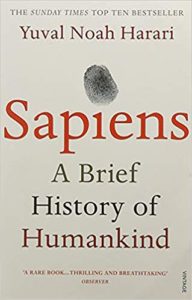 “I’m not trying to predict the future,” Yuval Harari argued in an Edge (an international group of the curious – see www.edge.org) discussion with Daniel Kahneman (March 5, 2015). “I’m trying to identify the horizon of possibilities that we are facing.”
“I’m not trying to predict the future,” Yuval Harari argued in an Edge (an international group of the curious – see www.edge.org) discussion with Daniel Kahneman (March 5, 2015). “I’m trying to identify the horizon of possibilities that we are facing.”
Professor Harari, of the Hebrew University of Jerusalem and an Oxford PhD, wrote this incredibly imaginative alternate view of the entire 200,000-year history of our species, Homo sapiens, on this earth, a mammal with a uniquely large brain. He suggests we have survived and prospered, perhaps too much, through the use of myths: “large numbers of strangers can cooperate successfully by believing in common myths,” even though we now know, “there are no gods in the universe, no nations, no money, no human rights, no laws, and no justice outside the common imagination of human beings.”
Harari re-thinks just about every “myth” that confuses our practices as human beings.
This “history” challenges our numerous “misconceptions” by stepping back from all we thought we knew, separating the growth of human existence through three “revolutions” of human existence: the cognitive (when we learned to think and communicate), the agricultural (when we shifted from nomadic movement to a more sedentary life), and the scientific (when we began asking “why” and “how.”).
In doing so he manages to skewer, with both rational argument and good humor, most of our cherished beliefs. And how little we actually know about our predecessors, saying, “a curtain of silence shrouds tens of thousands of years of history,” simply because of our lack of language and surviving relics.
What about the disappearances of many earlier species? We’ve been taught that climatic conditions or perhaps asteroids were the causes. Harari argues that we, homo sapiens, are more likely responsible for their demise than crashes or dramatic climate changes (ice ages, he notes, have occurred about once every 100,000 years). Our earth’s climate “is in constant flux” and most species have been able to adapt.
But many could not adapt to us!
As a student of risk management, I was interested to learn that our Agricultural Revolution, beginning about 12,000 years ago also increased our concern about our future, linked with the new “fundamental uncertainty of agriculture.” That is when we constructed “an imagined order.” Harari cites both the Code of Hammurabi (circa 1776 BCE) and the American Declaration of Independence (1776) as “imagined orders” that enabled “us to cooperate effectively and forge a better society.”
Acceptance of these “imagined orders” became “ embedded in the natural world and shaped our desires.” They “existed within the community network linking the subjective consciousness of many individuals.” Imagined orders both free and imprison us …
They are, Harari argues, how humans “organized themselves into mass cooperative networks.” They result in “imagined hierarchies” and “unjust discrimination” such as the Hindu caste system and the Babylonian separation of human beings into “superior men,” “commoners,” and “slaves.”
But, for example, do the “fundamental values” of equality and individual freedom (liberty) contradict each other? Harari suggests they do but that “this is no defect. Such contradictions are an inseparable part of every human culture. In fact, they are culture’s engines, responsible for the creativity and dynamism of our species.”
Money is also a shared myth. It is wholly imaginary but it does create healthy inter-dependence. Money is a “purely mental revolution” to “represent systemically the value of other things for the purpose of exchanging goods and services.”
Today, “more than 90 percent of all money – more than $50 trillion appearing in our accounts — exists only on computer servers.” Bitcoin, indeed! Money is the “apogee of human tolerance,” based on two “universal principles: convertibility and trust.”
Harari steps back and also studies religion, “a system of human norms and values founded on a belief in a superhuman order.” Religion moves from animism, to polytheism, to monotheism, to dualism, to socialist humanism, and, most recently, to evolutionary humanism. It appears to be a human construct.
Questions always remain: “Are we out of the global economic crisis, or is the worst yet to come? Will China continue growing until it becomes the leading superpower? Will the United States lose its hegemony? Is the upsurge of monotheistic fundamentalism the wave of the future or a local whirlpool of little long-term significance? Are we headed toward ecological disaster or technological paradise?”
Our most recent “revolution,” the Scientific, says Harari, began on July 16, 1945 at 05:29:53 with the explosion of the first atomic bomb. It also coincided with the explosion of population: 500 million in 1500 and 7.3 billion in 2015. One of the keys to our scientific progress has been “our willingness to admit ignorance,” leading to insatiable curiosity and constructive, mathematical observation. But we also have an “obsession with military technology.”
Is it time to “rethink the idea of continual progress?”
Are we obsessed with “growth?” Harari answers, “For better or worse, in sickness and in health, the modern economy has been growing like a hormone-soused teenager.” But is perpetual growth an illusion or “will this idea burst like all bubbles?”
His reply: “When growth becomes a supreme good, unrestricted by any other ethical considerations, it can easily lead to catastrophe.” Or will “ecological turmoil endanger the survival of homo sapiens itself?” Will only rats and cockroaches survive our insanity, as also suggested by Elizabeth Kolbert in The Sixth Extinction?
And what about “the pursuit of happiness?” Harari suggests a biological approach to happiness, that our natural system releases serotonin and other organic compounds to produce “ephemeral eddys of good fortune,” but never long-lasting and always returning us to a median level of euphoria. “Happiness” is, to him, entirely subjective, despite the story of Huxley’s “soma.”
How will it all end? Will advancing technology produce cyborgs of all of us, enabling individuals to “live” for hundreds of years, or will we simply destroy our species, leaving smiling cockroaches?
Harari’s last questions are: “What do we want to become?” and “What do we want to want?” Unanswerable, of course, but we are innately curious and creative!
Editor’s Note: Sapiens: A Brief History of Humankind by Yuval Noah Harari is published by HarperCollins, New York 2015.

About the Author: Felix Kloman is a sailor, rower, husband, father, grandfather, retired management consultant and, above all, a curious reader and writer. He’s explored how we as human beings and organizations respond to ever-present uncertainty in two books, ‘Mumpsimus Revisited’ (2005) and ‘The Fantods of Risk’ (2008). A 20-year resident of Lyme, he now writes book reviews, mostly of non-fiction, which explores our minds, our behavior, our politics and our history. But he does throw in a novel here and there. For more than 50 years, he’s put together the 17 syllables that comprise haiku, the traditional Japanese poetry, and now serves as the self-appointed “poet laureate” of Ashlawn Farm Coffee, where he may be seen on Friday mornings. His late wife, Ann, was also a writer, but of mystery novels, all of which begin in a village in midcoast Maine, strangely reminiscent of the town she and her husband visited every summer.